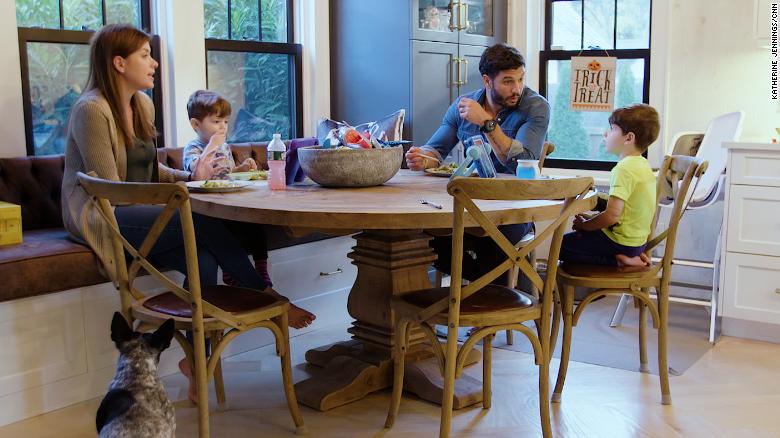I'm the mom of two young boys, ages 2 and 4, and they haven't ever slept through the night except for a few months when they were infants.
This is causing extreme sleep deprivation for my husband and me.The lack of sleep is affecting every aspect of my life -- including my mood, weight and marriage. My ability to operate on all cylinders is not possible without copious amounts of caffeine.It's for all these reasons that I set out on a quest with CNN Wellness eight weeks ago to get my family more sleep.
Sleep challenges are common in families
Before I set out on my journey, it was good to learn that what's happening to my family is very common.An estimated 25% to 50% of preschool children do not sleep enough, according to the US Centers for Disease Control and Prevention.Young children not falling asleep or staying asleep results in less sleep for their parents or caregivers. It can also lead to behavioral problems at school and hyperactivity and has been linked to childhood obesity.The National Sleep Foundation recommends that children ages 3 to 5 years old sleep 10 to 13 hours per day. Children ages 6 to 13 years old need nine to 11 hours of sleep per night. CNN Entertainment Reporter Chloe Melas (far left) turned to a sleep expert to help her family get more rest. She's shown with her husband, Brian Mazza (second from right), and their two sons.And it when it comes to adults, you should be aiming for seven to nine hours.I am definitely not getting that amount of sleep -- not even close.If I'm lucky, my husband and I sleep for three hours before one of our children wakes up and wanders into our bedroom. Then we sleep off and on until 5 a.m., when both children are up like roosters.I took my family's sad sleep experience to sleep guru Dr. Marc Weissbluth, professor emeritus of clinical pediatrics at Northwestern University's Feinberg School of Medicine. Over the past two months, I met with him virtually three times.
CNN Entertainment Reporter Chloe Melas (far left) turned to a sleep expert to help her family get more rest. She's shown with her husband, Brian Mazza (second from right), and their two sons.And it when it comes to adults, you should be aiming for seven to nine hours.I am definitely not getting that amount of sleep -- not even close.If I'm lucky, my husband and I sleep for three hours before one of our children wakes up and wanders into our bedroom. Then we sleep off and on until 5 a.m., when both children are up like roosters.I took my family's sad sleep experience to sleep guru Dr. Marc Weissbluth, professor emeritus of clinical pediatrics at Northwestern University's Feinberg School of Medicine. Over the past two months, I met with him virtually three times.
Go easy on yourself
During our first interview, I was emotional about the sleep crisis in my household, but Weissbluth said not to blame myself.
"Maybe you were just unlucky," he said. "Maybe you innocently did things that allowed bad habits to develop, and we don't want to beat ourselves up for what we did in the past. But going forward, we can always help children sleep better."Heard these excuses? Teething, growth spurts, sleep regressions, and/or being born a night owl. Weissbluth said to throw out every explanation I had ever been given about sleep issues in children.
That includes the "witching hour," that time toward the end of the day when children get cranky that parents often blame on a long day. The witching hour exists because our kids are sleep deprived, Weissbluth said. "It could be only perhaps because they have fragmented night sleep," he said. "If you have interrupted sleep, then you don't wake up as well rested, and your body is not as restored and so in the afternoon you lose it."
Institute earlier bedtime for kids
Kids need to get to sleep earlier and get more sleep. "If you look at surveys of bedtimes when children fall asleep over decades, not three years, but 10, 20, 30 years, it's gotten later and later so that children are having more difficulty falling asleep in part because their bedtime is too late," Weissbuth said.
All of our organs require oxygen glucose energy, but only one organ requires sleep, he said and that's the brain. "So if the brain doesn't get the food it needs it is going to have consequences, either in behavior or emotions or cognition."Over the last four years, I feel like I've tried ready-to-wake clocks, red night-lights and melatonin, and even pushed back my children's bedtime in hopes of making them more tired.
Simple sleep rules for little ones
Weissbluth, who authored the popular book "Healthy Sleep Habits, Happy Child," said that for my 4-year-old it would be to follow his "sleep rules." Honestly, that sounded too simple to actually work -- get in bed, close your eyes, be quiet, and try to sleep.If my 4-year-old were to follow the rules, he would be rewarded the following morning with a piece of candy or a small toy. If he did wake up during the night, we were to do a silent return to bed that would involve hugs and affection but no words. (We didn't want to encourage him to want to hang out with Mom and Dad.) That also meant restricting his privileges the following day, taking away or limiting something he enjoyed (a toy, his iPad, a certain snack) as a result of waking up.